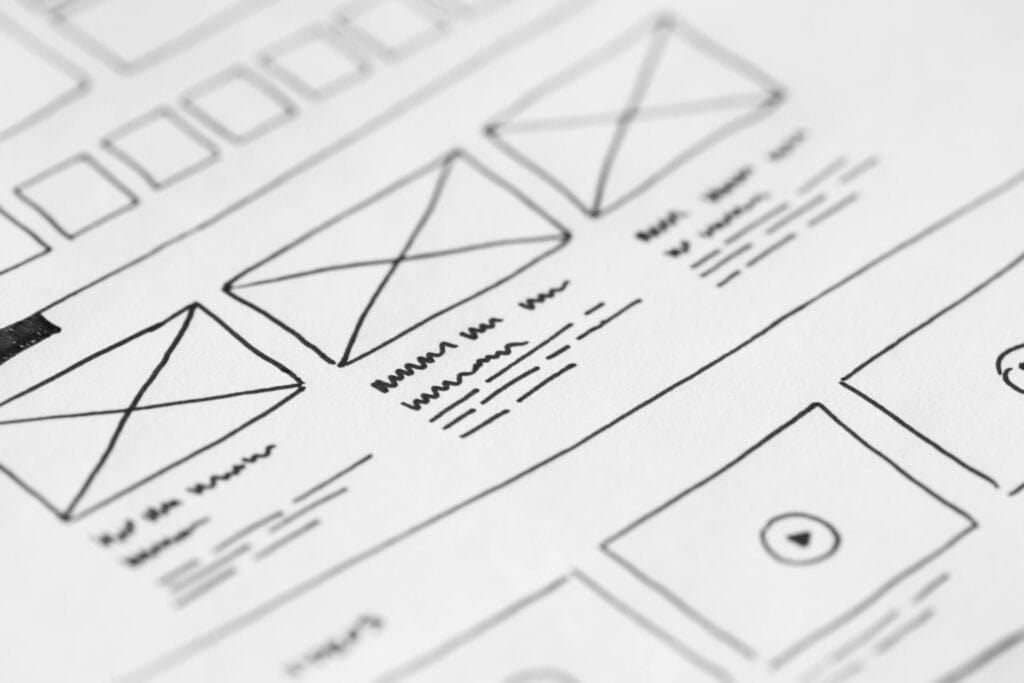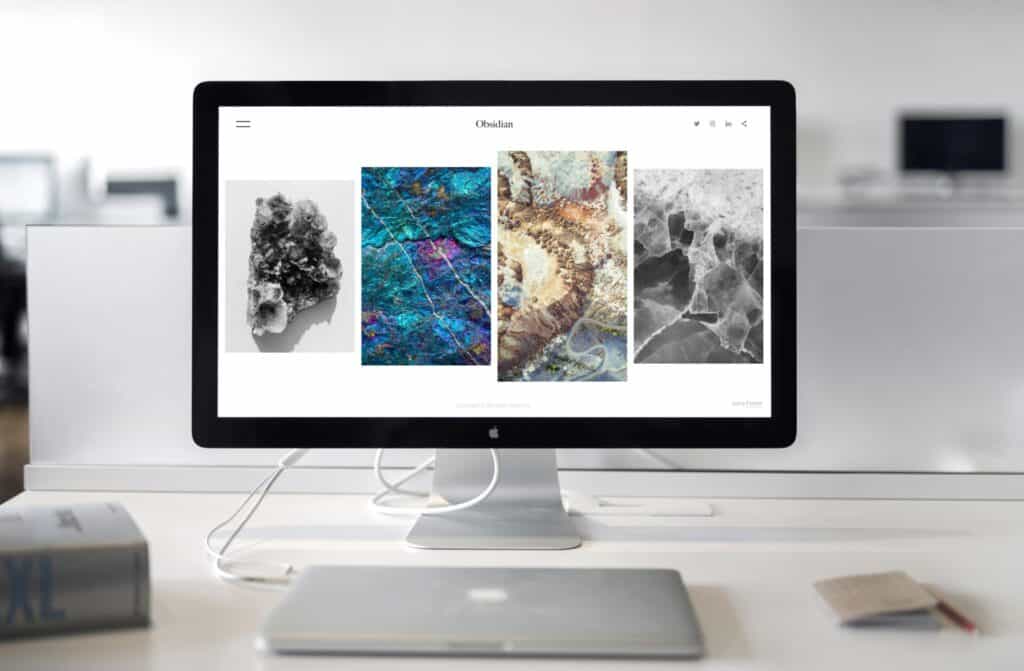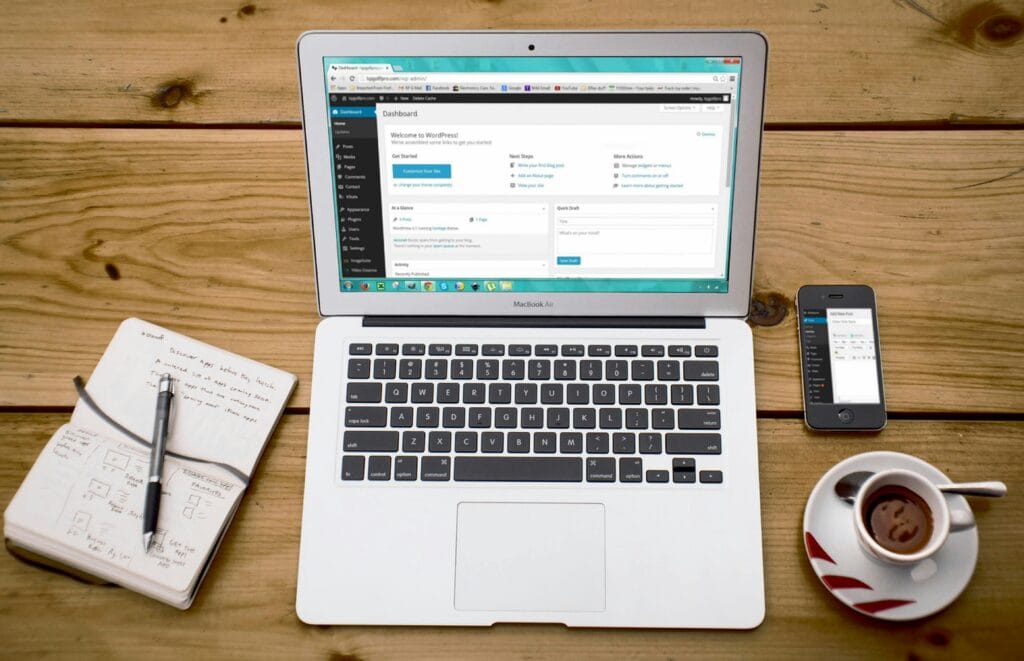Let’s imagine you’re starting a business. Past the initial admin, any modern business owner will want a website that captures their business’s unique personality and represents the quality of services or goods they offer. But, creating that online presence is no linear journey. Instead, it’s full of considerations, with a major one being whether you use a pre-made template or invest in a custom-designed website.
Almost all businesses face this dilemma. Their website is often the first impression potential customers will have of their brand, so choosing the right platform is crucial. Today’s blog post will compare the two main website options: custom website design and templates.
While the differences between the two can be assumed, we’re not fans of leaving things to guesswork. Custom design websites allow for complete creative control, tailoring every aspect to your specific vision – it’s a great option for businesses that want to stand out and carve a unique identity for themselves. On the other hand, website templates offer a more affordable and faster solution with pre-designed layouts and functionalities. While both have their merits, the best choice for your business depends on your specific goals and resources.
You might ask yourself if you want to build a brand identity that stands out from the competition. Or do you need a simple, functional website that is up and running quickly? Let’s delve into the advantages and disadvantages of each approach, helping you navigate the world of website design and make an informed decision that sets your business up for online success.

Understanding Custom Website Design
Custom website design is like having a tailor-made suit: it’s created specifically for you, reflecting your unique style and measurements. Another huge benefit is that no one else has it. You are the only one online who has that exact design, and there’s a lot of value in that.
In the digital world, this translates to a website built from scratch, tailored to your brand’s unique identity, needs, and goals.
Benefits of Custom Website Design
- Unique Brand Identity: With a custom website, you’re not limited by pre-existing templates or designs. Every element, from colour schemes and fonts to layouts and imagery, can be crafted to align with your brand. This creates a consistent and memorable online presence that distinguishes you from competitors.
- Tailored User Experience (UX): A custom design allows you to optimise the user experience for your specific target audience. You can create intuitive navigation, engaging content layouts, and interactive elements that guide visitors seamlessly through your website, leading to higher engagement and conversions.
- Scalability and Flexibility: Custom websites are built with future growth in mind. As your business evolves, your website can quickly adapt and scale to accommodate new features, functionalities, and content. This ensures your website remains relevant and effective in the long run.
- Search Engine Optimisation (SEO): Custom websites can be more easily optimised for search engines. This means incorporating best practices for keyword usage, site structure, and technical aspects, which can improve your website’s visibility and ranking in search results, driving organic traffic to your business. While templates are by no means bad for SEO, custom-spec website builds offer more flexibility.
Integration of Specialised Features: Whether you need a robust e-commerce platform, membership portals, or complex booking systems, custom design allows for seamless integration of specialised features. These tailored solutions streamline your operations and enhance the overall user experience.
Potential Drawbacks
The main drawbacks of custom website design are the higher upfront cost and longer development time compared to templates. Designing and building a website from scratch requires more resources and expertise, which can be a barrier for some businesses. However, the long-term benefits of a unique, scalable, and high-performing website often outweigh the initial investment.
Custom design empowers you to create a website that is truly an extension of your brand, providing your audience with a unique and engaging experience. While it may require a more significant investment, the potential for enhanced brand identity, improved UX, and long-term scalability make it an attractive option for businesses looking to make a lasting impact online.
Exploring Website Templates
Let’s consider website templates like pre-built houses. They are professionally planned and more affordable than building from scratch, and they come with a solid foundation and essential spaces. Website templates operate similarly. They are pre-designed website layouts that provide a basic structure, visual elements, and crucial functionalities like contact forms and galleries.
Advantages of Website Templates
- Cost-Effective: Templates are significantly more budget-friendly than custom designs. They eliminate the need for extensive design and development work, making them an attractive option for businesses with limited resources.
- Quick to Launch: Templates dramatically shorten the time it takes to get your website online. You can choose a design, customise it with your content, and launch in days or weeks, compared to the lengthier timeframe a custom build might take.
- Variety of Designs: Template providers offer designs catering to multiple industries and aesthetics. Whether you’re a photographer, a consultant, or a retailer, you can find a template that aligns with your brand’s style.
- User-Friendly Interfaces: Most templates come with intuitive drag-and-drop builders, making customising your website without coding knowledge easy. You can easily add, remove, or rearrange elements, change colours, and personalise content.
Limitations of Website Templates
- Less Unique: While customisable, templates may lack the distinctive flair of a custom design. Your website might resemble others using the same template, making it harder to stand out.
- Potential Design Constraints: Some templates may have layout and design flexibility limitations. Achieving a specific look or incorporating unique features might be challenging without extensive modifications.
- Limited Scalability: Templates might not be the best option for businesses with ambitious growth plans. As your business expands, you might need more advanced functionalities or integrations that a template can’t easily accommodate.
Who Are Templates Best For?
- Small Businesses and Startups: With limited budgets and a need to establish an online presence quickly, templates offer an accessible entry point to the digital world.
- Businesses with Simple Website Needs: If your website primarily serves as an online brochure or a contact point, a template can provide all the necessary functionalities without the complexity of a custom build.
- Individuals or Organizations with Limited Technical Skills: Templates’ user-friendly nature empowers those without coding experience to create and manage their websites independently.
Templates offer a convenient, affordable, and user-friendly solution for businesses seeking an essential online presence. While they might offer a different level of uniqueness or scalability than custom design, they provide a solid starting point for many businesses, especially those with limited resources or simple website requirements.

Key Factors to Consider
Choosing between custom website design and templates isn’t a one-size-fits-all decision. It requires careful consideration of several factors, each crucial in determining the best fit for your business.
Budget
Budget is a primary factor influencing your website design choice. Due to the extensive design and development work, custom websites typically cost more than templates.
- Custom Design: Costs can range widely, from a few thousand to tens of thousands, depending on complexity, features, and the client’s vision.
- Templates: Templates are far more affordable and are often included in hosting services such as Wix, Squarespace, and WordPress.
Timeline
The urgency of launching your website is another crucial consideration that also requires foresight—will you outgrow a template quickly, or is a custom design a worthwhile investment?
- Custom Design: A custom website’s design and development process can take several weeks or even months, depending on its scope and complexity. A highly structured process is required to achieve the right end product.
- Templates: Templates significantly expedite the launch process. With the basic structure already in place, you can often have a functional website up and running within days or weeks.
Business Goals
Your website’s objectives will heavily influence your design choice. Factors to consider include:
- Lead Generation: If your goal is to attract and capture leads, a custom design allows for tailored landing pages, forms, and calls to action, optimising the lead generation process.
- Sales: For e-commerce businesses, a custom design can provide a seamless shopping experience, integrated product catalogues, and secure payment gateways, driving sales and customer satisfaction.
- Branding: If establishing a unique and memorable brand identity is paramount, custom design offers the creative freedom to craft a visually stunning and distinctive online presence.
Technical Skills
Consider your in-house technical expertise when making your decision.
- Custom Design: If you need more web development skills, you’ll likely need to outsource the design and build to a professional agency or freelancer.
- Templates: Templates are ideal for those with limited technical knowledge, thanks to their user-friendly interfaces and drag-and-drop builders.
Long-Term Vision
Think about the future of your business and website.
- Custom Design: Custom websites offer greater scalability and flexibility, making them adaptable to future growth and changes in your business.
- Templates: While templates can be customised to some extent, their scalability might be limited. If you anticipate significant growth or evolving website needs, a custom design might be a more sustainable choice.
If you feel overwhelmed by these factors, it’s worth chatting with a website design company. Full Stack Industries is here to help. We can help you make an informed decision that aligns with your budget, timeline, business goals, technical capabilities, and long-term vision.
Making the Right Decision That Suits Your Objectives
Choosing the ideal website platform can feel overwhelming, but now you understand the critical differences between custom design and templates. To further simplify your decision, consider this guidance:
Where Custom Design Shines
- Established Brands: If you have a strong brand identity and want your website to reflect it perfectly, custom design is the way to go.
- Complex Functionalities: E-commerce stores, membership sites, or platforms with unique features will benefit from the tailored approach of custom design.
- High Growth Potential: Custom design’s scalability and flexibility will be invaluable if you envision rapid expansion and evolving website needs.
- Competitive Industries: To stand out in a crowded market, a custom-designed website can differentiate you and leave a lasting impression.
Where Templates Excel
- Startups and Small Businesses: Templates offer a cost-effective and efficient solution if you have a limited budget and need a website quickly.
- Simple Websites: A template can be more than sufficient if your website’s primary purpose is to provide basic information and contact details.
- DIY Approach: A template’s user-friendly interface is ideal if you prefer to manage your website yourself and have limited technical skills.
The Hybrid Approach: Customising a Template
For a middle-ground solution, consider customising a template. This allows you to start with a pre-designed layout and basic functionalities, then add custom elements, branding, and features to tailor it to your needs. This can be a great way to achieve a unique look and feel while keeping costs and development time manageable.
Aligning Your Website with Your Business Strategy
Remember, your website is a powerful tool for achieving your business goals. Whether you choose a custom design, a template, or a hybrid approach, ensure your decision aligns with your overall business strategy. Your website should look good and function effectively to support your marketing, sales, and brand-building efforts.
Take the time to evaluate your needs, resources, and long-term goals. Ultimately, the most high-tech and expensive website doesn’t fit the needs of a smaller sole trader. Create a website that serves as a valuable asset, propelling your business towards success in the digital landscape while accurately reflecting your offering to your customers.
Final Thoughts
The decision between custom website design and templates is crucial, with significant implications for your brand’s online presence and overall success. We’ve explored each approach’s unique strengths and potential limitations, highlighting factors like budget, timeline, business goals, and technical skills.
Remember, there is no universal “right” answer. The best choice for your business depends on your specific needs and resources.
If you’re ready to take the next step in creating your online presence, we encourage you to explore custom design and template options. Consult with experienced web developers, browse template libraries, and envision how each choice aligns with your business strategy.
Need help making a decision? Our team of experts is here to guide you through the process. Contact us today for a chat and discover how we can help you build a website that reflects your brand and drives your business forward.






